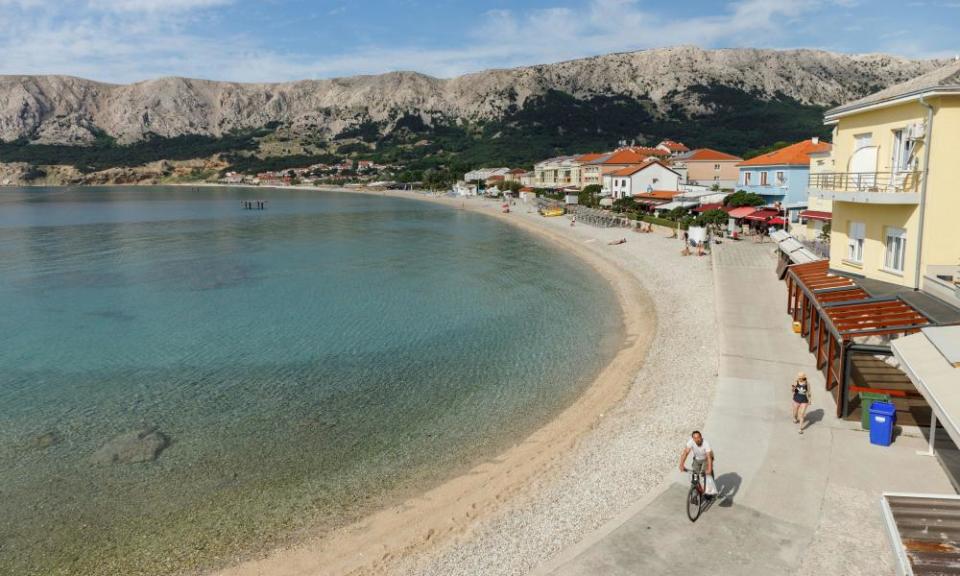Should we just pay off all Covid-related rent arrears?

As we edge towards the beginning of the end of the pandemic, the solution to the world’s gravest public health crisis in 100 years is pretty clear. But solutions to some of the secondary problems that Covid-19 has brought with it are less obvious.
Take housing: job losses and financial hardship have conspired to leave millions of renters in the developed world in arrears. Many have been spared evictions only by government moratoriums on landlords turfing tenants out.
What is to be done when those eviction truces come to an end? California is devising a plan that might look expensive in the short term but could prove cheap in the long run. It is pursuing an ambitious $5bn (£3.6bn) plan to pay off the entirety of unpaid rent of low-income tenants who fell behind during the pandemic, in what could constitute the largest ever rent-relief programme in the US.
My colleague Sam Levin in Los Angeles took a closer look at the idea. The big question is whether overdrawn exchequers elsewhere in the world will prove as generous.
Otherwise, this week there was plenty of Upside to be found in:
• The wild meadows of Germany’s bustling cities. Two-minute read
• Wales coming to the end of the road... 90-second dash
• …as Europe plans a new network of sleeper trains. Two-minute read
• The sporting superstar who has lived with HIV for 30 years. Four-minute read
• A cure for hiccups? A quick sip
What we liked
The Croatian island of Krk may be short on vowels, but it is long on sunshine and wind – and reckons it will be entirely self-sufficient thanks to renewable energy by the end of the decade.

“Sextortion” is a growing evil in Egypt. But now an online group has been formed to save hundreds of women from this pernicious crime.
On the lighter side, this is cute: the homeless man who returned a $10,000 check – and turned his life around in the process.
What we heard
We had a generous number of responses to our post about philanthropy last week, and in particular our question as to whether governments or billionaires are better at deciding how to spend surplus cash.
Many readers felt both the state and philanthropists have a role to play, as Birger Karlsson from Denmark wrote.
Maybe the question is not “either/or” but both through collaboration. Why not an independent government-funded board advising philanthropists on wise spending. If they want to get rid of some of their cash, they might as well spend them on solving fundamental societal problems – such as the roots of poverty, drug use and obesity.
In Vancouver, Raynard von Hahn disagreed
You ask if philanthropists or governments are better at channelling money where it needs to go? I suggest neither.
Our current economic system enables big business and government to systematically exploit the masses and push more and more people into poverty. While it’s nice of big business philanthropists like MacKenzie Scott to “give back” and government to spend on social services, if we want a more sustainable society, then we need to transition to a co-operative economic model, as exemplified by Mondragon Co-op in Spain and by many the co-operatives operating in the Emilia-Romagna region of Italy.
Jo McRae offered an Australian perspective
Governments only add to the need for philanthropy. At the moment, the Australian government is throwing public money to the most destructive, out-of-sync with the times group of all – fossil fuel companies. And they certainly don’t need it.
Huge concessions go to the timber industry. Both industries are contributing to climate change, pollution, forest fires, destruction of wildlife, etc. So no wonder that I find an endless stream of begging emails in my inbox.
While in San Francisco, Michael Clark worried about the motivations of donors
It is good that donors have stepped up as their own incomes and fortunes have increased considerably faster than the average. Their motives for giving may be many, and not all entirely wholesome, but their generosity is nonetheless to be applauded.
However,
• if those who are giving so much have gained their fortunes in unwholesome ways or at the expense of the basic well-being and rights of others;
• if they have gained their fortunes in illegal, immoral or even amoral ways;
• if the giving is to causes that disproportionally benefit subsets of the population of their choosing rather than those most in need;
• if, lastly and perhaps most importantly, their giving is motivated by notions of future, further gains in wealth or fame for themselves,
then it falls short of true giving.
As societies evolve, the systems that promote and allow such uninhibited accumulation of vast wealth are always those that are least compassionate, least caring of their members and least able to help all those who need help. True social democracies that practice open market economics while providing a real welfare and safety net to those less fortunate are the ones to follow.
Dr Anne Roemer-Mahler from Sussex University asked a different question
Thanks for writing about this important topic. I would add another question to the ones you raised at the end of your piece: What are the conditions that have made it possible for a few individuals to accumulate so much money and for this to be widely accepted (indeed celebrated) as a mechanism by which resources are redistributed in society?While it is obviously important to pay attention to the individuals/organisations in control of so much money and on the effects that their actions have, I think it is equally important to ask what made this possible and accepted in the first place.
Do keep your thoughts coming on this by writing to us.
Meanwhile, we were flattered by the news that US media company Buzzfeed is looking to start a new strand of uplifting journalism. The working title? “The Upside”…
Reporters and editors! I'm recruiting for this role at BuzzFeed News. It's an incredible chance to build an entirely new vertical and team here. Please apply or pass this on to people you think might be a good fit! https://t.co/bl5eYSNUvs
— David Mack (@davidmackau) June 21, 2021
Where was the Upside?
With a UK plan to ban junk food advertising before a 9pm watershed.

Also on Britain’s finest pick-your-own farms, as identified by our readers.
Get in Touch
If you have any questions or comments about any of our newsletters, please email newsletters@theguardian.com

 Yahoo Movies
Yahoo Movies 
